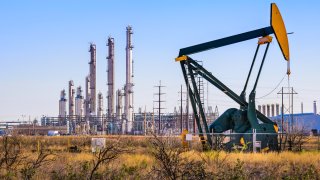
United States domestic oil production hit an all-time high last week, contrasting with efforts to slice heat-trapping carbon emissions by the Biden administration and world leaders.
And it conflicts with oft-repeated Republican talking points of a Biden “war on American energy.”
The U.S. Department of Energy’s Energy Information Administration reported that American oil production in the first week of October hit 13.2 million barrels per day, passing the previous record set in 2020 by 100,000 barrels. Weekly domestic oil production has doubled from the first week in October 2012 to now.
With the United Nations and scientists saying the world needs to cut carbon emissions — from burning coal, oil and natural gas — by 43% by 2030 and down to zero or close to it by 2050, several developed countries across the world are dangerously producing more, not less, fossil fuels, experts say.
Get top local stories in Philly delivered to you every morning. >Sign up for NBC Philadelphia's News Headlines newsletter.
“Continuing to expand oil and gas production is hypocritical and not at all consistent with the global call to phase down fossil fuels,” said climate scientist Bill Hare, CEO of Climate Analytics which helps track global actions and policies to curb climate change. “The U.S. support for expanded fossil fuel production will undermine global efforts to reduce emissions.”
But the U.S. isn’t alone in this. Hare pointed to Norway, Australia, the United Kingdom and Canada, adding France because of support of the company TotalEnergies. And the designated president of upcoming climate negotiations heads the United Arab Emirates national oil company, which has announced plans to boost drilling.
“From Exxon-Mobil to Shell, Guyana to Cote d’Ivorie, those with fossil resources seek to boost production and delay action to reduce our greenhouse gas emissions,” said MIT professor John Sterman, a senior advisor at Climate Interactive, an organization that models future warming based on countries' proposed actions. He said that path will lead to “catastrophe.”
U.S. & World
Stories that affect your life across the U.S. and around the world.
Stanford University climate scientist Rob Jackson, who heads the emissions-tallying group Global Carbon Project, said no country or company wants to cut oil and gas production if someone else is going to sell oil anyway.
“We’re in a fossil trap,” Jackson said.
White House officials have long considered increased oil production inside the United States as a bridge to help soften the transition to renewable energy sources. Officials have closely tracked domestic production, noting that output has risen by an average of more than one million barrels a day over the past year. It’s evidence that many of the oil price increases reflect the policy choices of other countries including Saudi Arabia on what is a globally priced commodity.
The Biden administration has committed several hundred billions of dollars in government incentives for moving away from fossil fuels to limit the damage from climate change.
Just because the United States is increasing oil production, that doesn’t mean it won’t phase down emissions, said Samantha Gross, director of energy security and climate at the centrist Brookings Institution. She said U.S. oil is less carbon-intensive than other oil, an argument the UAE’s oil company also makes.
“So long as oil is demanded,” Gross said. “Demand drives production — we need to change the whole system to reduce oil demand.”
“Replacing oil in power production is a lot easier than replacing oil in transportation,” Gross said in an email. “We need changes in the transportation sector, along with policies to reduce demand for transport — like teleworking, walkable neighborhoods and good public transportation.”
The Energy Department’s EIA in a separate document predicted global carbon emissions will rise, not plummet, through 2050.
“If the EIA is right, we’ll add another trillion tons of CO2 pollution to the atmosphere by 2050 and millions of people will die,” Stanford’s Jackson said. “There’s no other way to see it.”
Republican senators and congressmen, including the House Energy and Commerce Committee, this year have repeated the phrase “Biden’s War on American Energy.”
Jared Bernstein, chair of the White House Council of Economic Advisers, pushed back on that last month.
“There are thousands of available permits — places where oil companies could drill,” Bernstein said. “They’ve been highly profitable. They’ve been highly productive. So, I don’t think that’s the problem.”
Stanford’s Jackson said the Biden administration has swung back and forth on energy exploration, approving the Willow oil project in Alaska but cancelling drilling permits in the Arctic National Wildlife Refuge.
“It’s clear that the Biden administration is not running a war against fossil fuels, or if it is, it’s a very unsuccessful war,” Climate Analytics Hare said.
Associated Press reporter Joshua Boak contributed from Washington, D.C.



